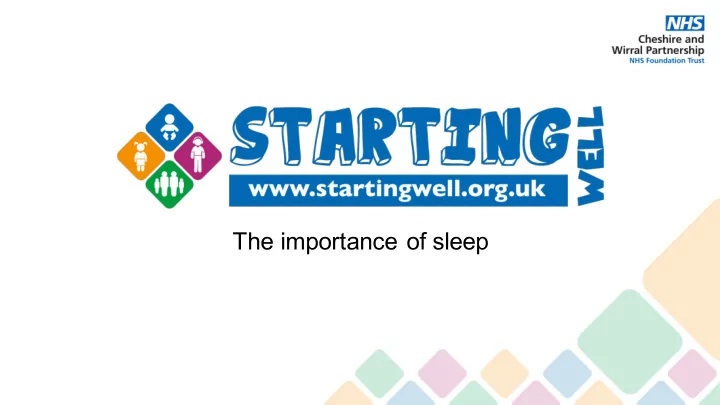

The importance of sleep
Who are we? The Starting Well Service brings together Early Years Workers Health Visitors, Family Nurse Partnership and School Health which include immunisations and vaccinations. The team have an extensive range of skills and experience across the whole 0 - 19 workforce to deliver an integrated service for local children, families and young people. The service is based within 8 Cheshire West and Chester Children’s Centres. Your local Children’s Centre is Victoria Road, Neumann Street, Northwich, Cheshire. Telephone – 01606 555286 email – cwp.victoriaroadstartingwell@nhs.net
Ensuring your child has adequate sleep is essential for their health and wellbeing. Children who are sleep deprived are: - Grumpy - Irritable and may be hyperactive Lack of sleep affects their: - Growth - Health - Immune System - Ability to learn and deveolpment - Concentration - Memory
How much sleep do children need? Below are the approximate hours of sleep needed by children of different ages, as recommended by the Millpond Children's Sleep Clinic. 2 years 6 years 11 years daytime: 1 hour 30 minutes night-time: 10 hours 45 minutes night-time: 9 hours 30 minutes night-time: 11 hours 30 minutes 7 years 12 years 3 years night-time: 10 hours 30 minutes night-time: 9 hours 15 minutes daytime: 0 to 45 minutes 8 years 13 years night-time: 11 hours 30 minutes night-time: 10 hours 15 minutes night-time: 9 hours 15 minutes to 12 hours 9 years 14 years 4 years night-time: 10 hours night-time: 9 hours night-time: 11 hours 30 minutes 10 years 15 years 5 years night-time: 9 hours 45 minutes night-time: 9 hours night-time: 11 hours 16 years night-time: 9 hours
Relaxation tips to help sleep Doing the same relaxing things in the same order and at the same time each night helps promote good sleep: - A warm (not hot) bath will help your child relax and get ready for sleep. - Keeping lights dim encourages your child's body to produce the sleep hormone melatonin. - Once they're in bed, encourage your child to read quietly or listen to some relaxing music, or read a story together. - Breathing exercise before bed.
Your child's bedroom Your child's bedroom should ideally be dark, quiet and tidy. It should be well ventilated and kept at a temperature of about 18 to 24C. A night light can help to reduce night time fears in young children. Fit some thick curtains to block out any daylight. Having a TV in your child’s bedroom does not encourage good sleep patterns. Watching TV before bed has a negative effect on the quality of your child’s sleep
Avoid screens in the bedroom Tablets, smartphones, TVs and other electronic gadgets can affect how easily children get to sleep. Older children may also stay up late or even wake in the middle of the night to use social media. Try to keep your child's bedroom a screen-free zone, and get them to charge their phones in another room. Encourage your child to stop using screens an hour before bedtime.
Get help with sleep problems If you've tried these tips but your child keeps having problems getting to sleep or sleeping through the night, you may feel you want more support. You can speak to your GP, School Health Nurse or Health Visitor to begin with. They may refer you to a child psychologist or another expert.
Resources Sleep for children www.startingwell.org.uk/1273 Sleep for teens www.startingwell.org.uk/1272 www.mymind.org.uk www.sleepcouncil.org.uk/ www.nhs.uk
Thank you for listening. Please keep up to date with the Starting Well Service by following us on Twitter @startingwellCWP
Recommend
More recommend